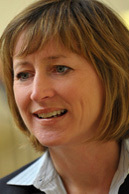When confronted with an ethical dilemma, most of us like to think we would stand up for our principles. But we are not as ethical as we think we are, according to Ann Tenbrunsel, the Rex and Alice A. Martin Professor of Business Ethics at the University of Notre Dame’s Mendoza College of Business and co-author of “Blind Spots: Why We Fail to do What’s Right and What to do About it.”
“A blind spot is an unknown obstacle that prevents us from seeing our unethical behavior,” Tenbrunsel explains. “It doesn’t allow us to see the gap between who we think we are, who we’d like to be, and who we truly are.”

Blind spots can originate with individuals and accumulate to an organizational-level, from the collapse of Enron and corruption in the tobacco industry, to sales of the defective Ford Pinto and the downfall of Bernard Madoff.
“Clearly, Madoff was a crook,” Tenbrunsel says. “But there are a host of people who supported his decisions and we would argue many of them did so unknowingly. Why does that happen? Why do we all behave in ways that contradict our values?”
Tenbrunsel and co-author Max Bazerman show that we are unaware of the blind spots that keep us from recognizing how we engage in unethical actions.
They reference a study in which people were asked if they planned to contribute to Daffodil Days, a fundraising event which supports the American Cancer Society.
“Roughly 80 percent said they planned to give, Tenbrunsel says. “But on collection day, only about half actually contributed.
“When we are predicting how we will behave, we are thinking abstractly” she explains. “But, when we are actually making the decisions, we are thinking very concretely, looking at feasibility. If you consider the Daffodil Days example, a participant may say ‘I didn’t realize that at the time I would be asked to donate, I would only have five dollars in my pocket, which I could either donate or use to buy lunch.’ Visceral forces also play a role when we’re called to make a decision. ‘I’m hungry, I’m thirsty, I’m angry, I’m fearful that I’m losing my job.’ We become motivated to eliminate these forces and all else, including ethical values, takes a back seat. These factors are difficult to predict, but impact us directly and lead to what we call ‘ethical fading.’”
Tenbrunsel says ethical fading—the removal of ethics from the decision-making process—have led to tragedies and scandals such as the Challenger space shuttle disaster, steroid use in Major League Baseball, the crash in the financial markets, and the energy crisis. “Blind Spots” demonstrates how ethical standards shift, how we neglect to notice and act on the unethical behavior of others, and how compliance initiatives can actually promote unethical behavior.
At the organizational level, there are important implications.
“If you have every individual falling prey to their ethical illusions, including those leading, an error in judgment can blossom into a whole series of activities that can damage reputation,” Tenbrunsel says.
“People believe they will behave ethically in a given situation, but they don’t. Then they believe they behaved ethically when they didn’t. It’s no surprise, then, that most individuals erroneously believe they are more ethical than the majority of their peers,” according to Tenbrunsel.
Going a step further, she says “motivated blindness” is people’s tendency to not notice the unethical behavior of others because it’s in their best interest not to notice. She points to credit rating agencies as a good example.
“They are supposed to provide objective, unbiased ratings of the creditworthiness of issuers of debt obligations (including companies, nonprofit organizations and federal, state and local governments) as well as the debt instruments these financial organizations sell to the public,” she says. “However, their compensation has been tied to anything but objectivity. Specifically, the largest credit rating agencies, including Standard & Poor’s, Moody’s and Fitch, are paid by the companies they rate instead of by the investors who have the most to lose from inaccurate ratings. It is not a surprise that the rating agencies that provide the highest ratings have the most business.”
“If we are to truly eliminate conflicts of interest,” Tenbrunsel and Bazerman wrote in an April New York Times op-ed, “we must understand the psychology behind them.”
Contact: Ann Tenbrunsel, 574-631-7402 or tenbrunsel.1@nd.edu